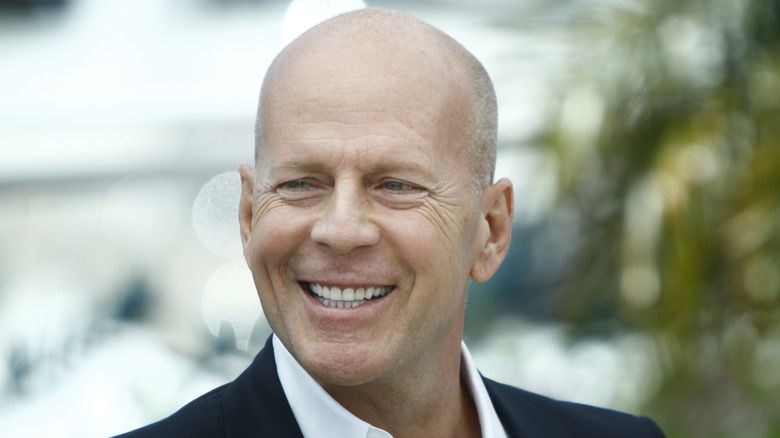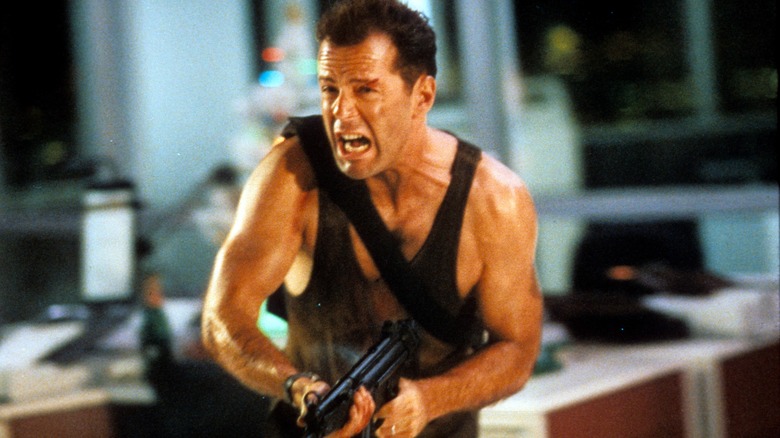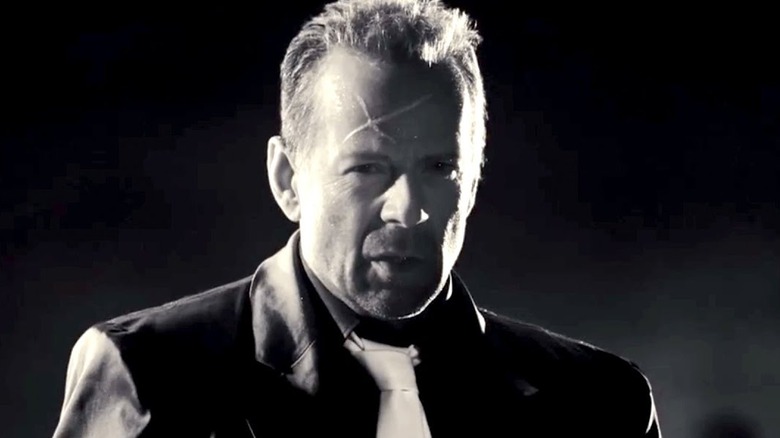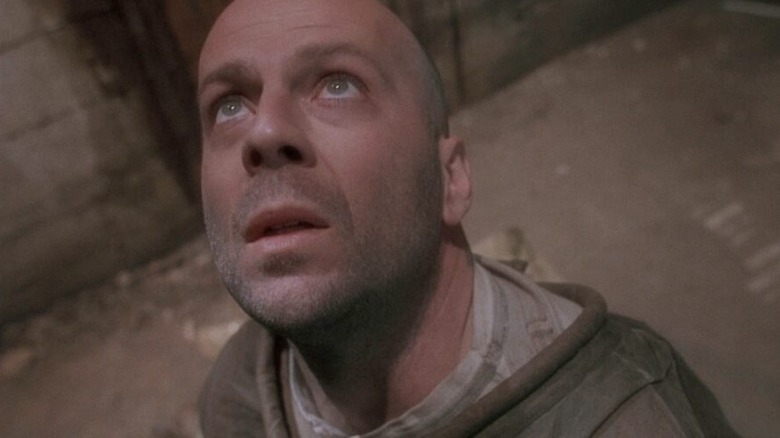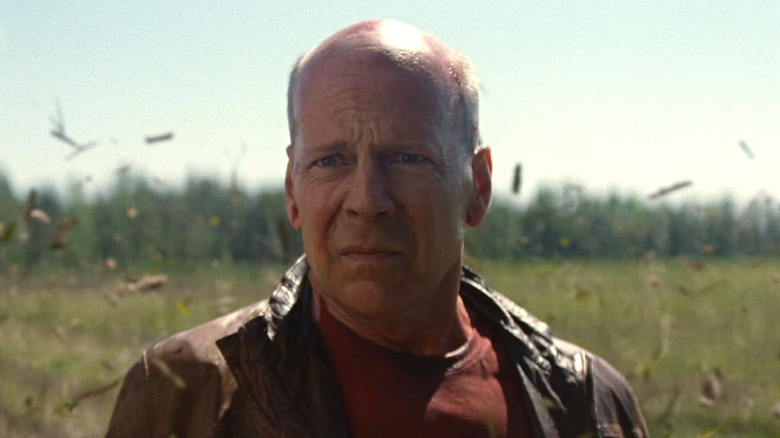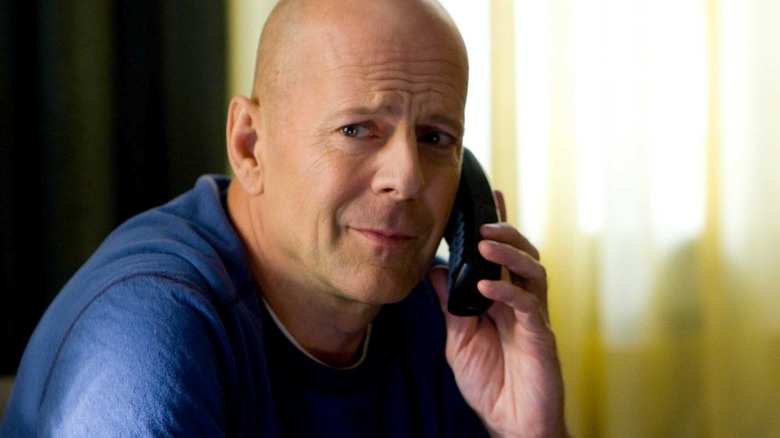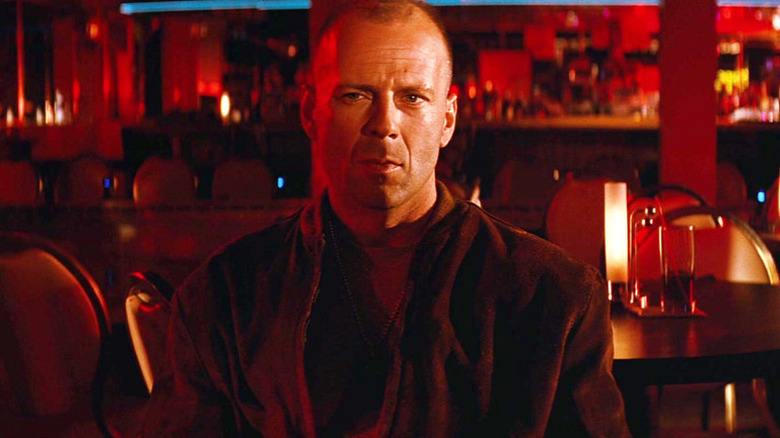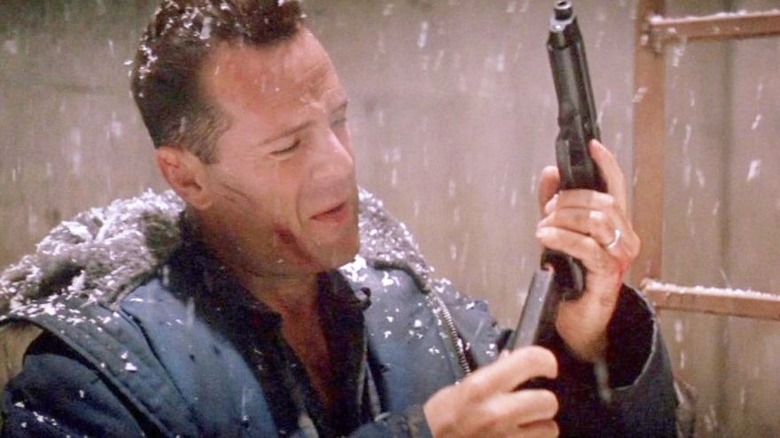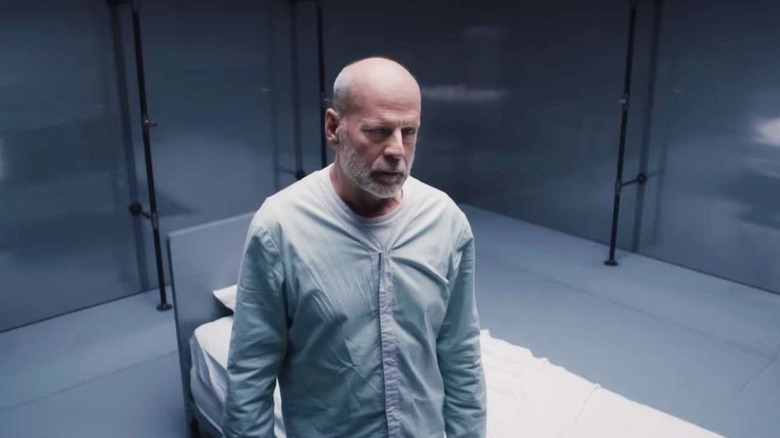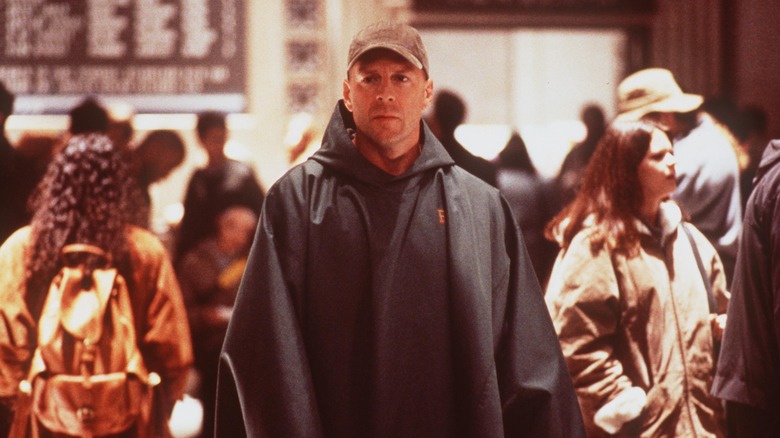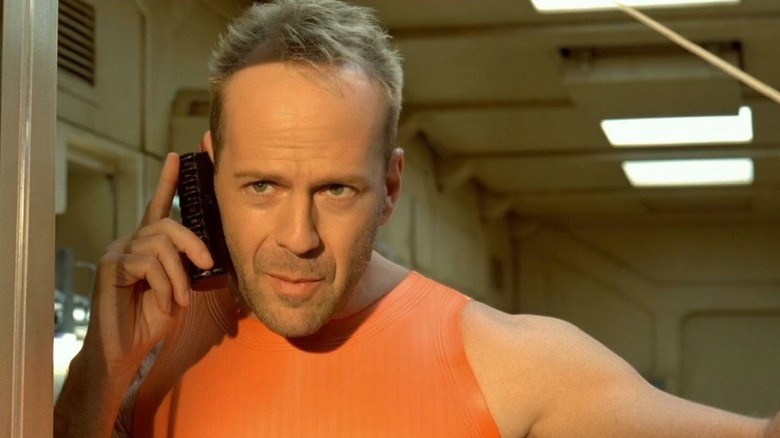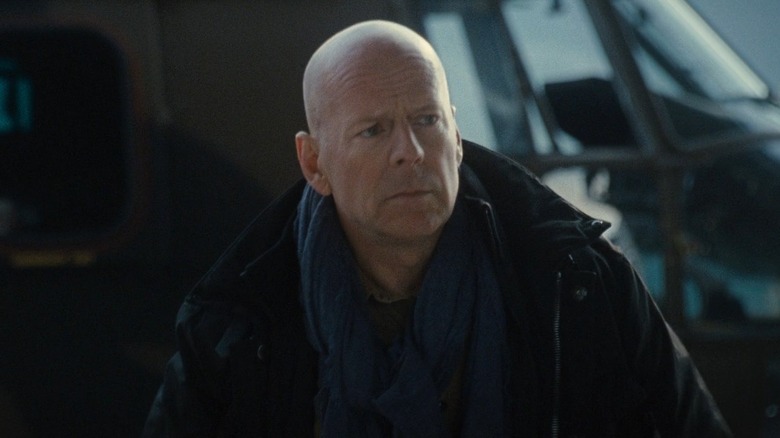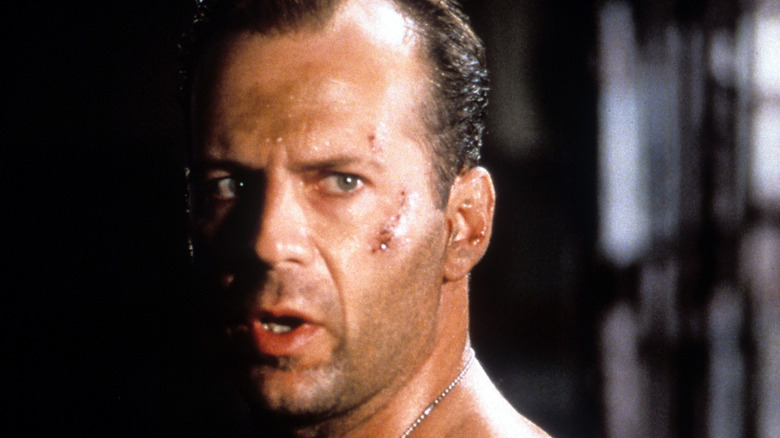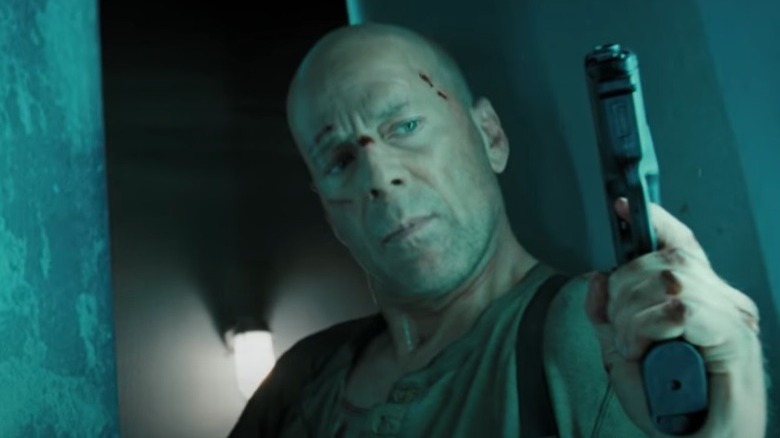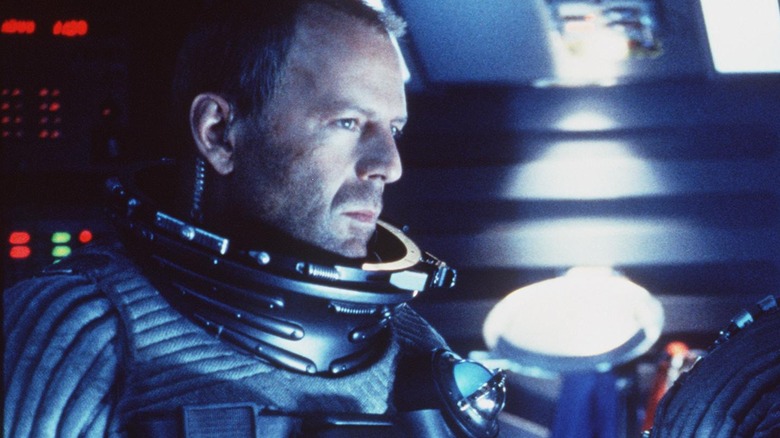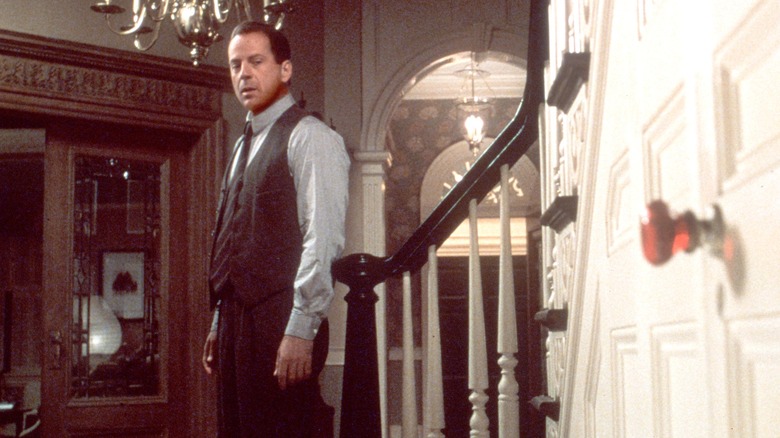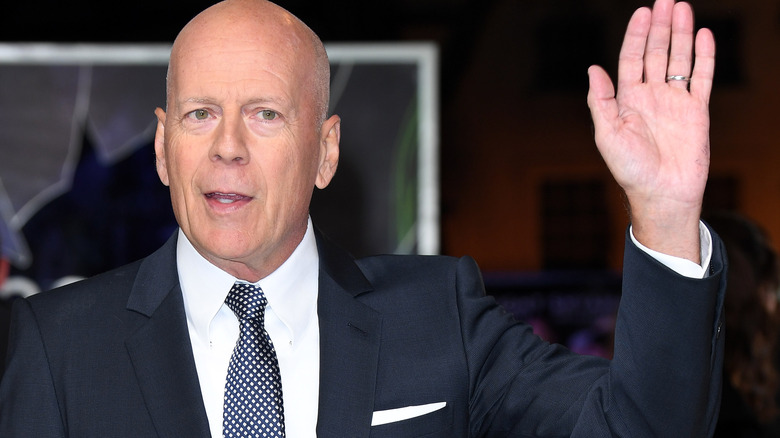15 Most Popular Bruce Willis Movies, Ranked
Bruce Willis might have starred in one of the biggest action movies of the 1980s — one that may or may not be a Christmas movie, depending on who you ask — but he was never the typical big action star. Not only did John McClane spend as much time taking licks as giving them over the course of "Die Hard," but Willis did not embody the huge, bulked-up action hero with arms bigger than his head. He was also a lot funnier, a lot more charming, and had more actual acting chops than most of his peers in the genre. And for those reasons and more, he continued to be a big box office draw throughout the 1990s and well into the new millennium.
Unfortunately, we now know that there was a tragic (but totally understandable) reason behind his racking up of forgettable direct-to-video roles during the 2010s. Upon the announcement of his disease and his subsequent retirement from acting in 2022, the world was more than ready to brush aside those roles that he took for the financial security of his family and focus on all of the amazing cinematic memories Willis had given us up to that point. With that in mind, here are the 15 movies that cemented Willis's popularity as a beloved movie star the world over — encompassing the overlap between the highest Rotten Tomatoes audience scores of his career, and the films that have earned the most money at the global box office (not counting cameos).
15. Die Hard
Bruce Willis already seemed like a fully-formed movie star when he led the landmark 1988 action classic "Die Hard." In fact, Willis had only done a few small film roles and was primarily known as the male lead in the rom-com TV series "Moonlighting." On paper, John McClane might have seemed like the type of role that would have gone to Arnold Schwarzenegger — and in fact, he was offered it first, but declined. So the studio, producers, and director rolled the dice on Willis instead, at that point a largely untested quantity in terms of his ability to lead a big-budget action movie.
As much of a well-worn cliché as it is to say, it couldn't be more true in this case — it's impossible to imagine anyone but Willis playing John McClane. Willis brought the flawed everyman charm that originally defined McClane, and in the process, helped to usher in a new type of action hero. The giant, heavily-armed, seemingly invincible bodybuilder-type action stars of the '80s soon began to make way for more grounded and realistic protagonists, which would come to define the action movie genre for a good chunk of the 1990s. And Willis as John McClane played a huge part in that shift. With "Die Hard," not only was both a massive franchise and one of the all-time great film protagonists born, but so too was Bruce Willis the blockbuster movie star.
14. Sin City
Thanks to "Pulp Fiction" — more on that later — Bruce Willis entered the orbit of not only Quentin Tarantino but also his pal and frequent collaborator Robert Rodriguez. A little over a decade later, Rodriguez would finally work with the actor directly when he cast Willis in his nearly shot-for-shot comic book adaptation "Sin City." Despite being an ensemble piece that contained at least a dozen A-listers, Willis scored one of the movie's meatiest roles as Detective John Hartigan — not to mention one of the few characters that gets to appear in multiple vignettes.
Willis absolutely nails the role of a grizzled noir-type protagonist here, and it's a shame that we didn't see him doing more film noir work. It was also great to see him willing to take on an ensemble role in which he wasn't a clearly-defined lead. Think about actors like Tom Cruise, George Clooney, and Leonardo DiCaprio at that point in their careers and whether or not they would still do movies where they were anything lower than second or third-billed (cameos notwithstanding). It's that type of thing that not only endears you to your fans, but proves that you still truly love your craft and aren't only in it to get your name at the top of movie posters and the front of trailers. Willis also clearly enjoyed working with Rodriguez, as he'd later appear in 2007's "Planet Terror" — and again, fairly far down the cast list.
13. 12 Monkeys
Bruce Willis got to star in some the best cult classic sci-fi flicks of the 1990s, and the one that sometimes gets overlooked is 1995's "12 Monkeys," which remains the biggest box office hit of filmmaker Terry Gilliam's career by a rather sizeable margin. One of the reasons the film doesn't always get brought up when discussing Willis's filmography is that co-star Brad Pitt arguably stole the show, in particular because it was one of the first films that showed off both Pitt's formidable acting chops and his ability to play a role that didn't trade on his looks and charm.
That's not to say that Willis's performance as time-hopping convict James Cole didn't get acclaim as well. Rolling Stone called it "an eruptive performance of startling emotional intensity," marking some of the highest praise that Willis had gotten for his acting in his entire career up to that point. In fact, "12 Monkeys" came just a year after "Pulp Fiction," another movie that had critics finally taking notice of Willis's ability to do more than comedies and bombastic action flicks. Even with what was then assumed to be the end of the "Die Hard" franchise behind him, Willis proved in the mid-'90s that he had far from peaked and was only just getting started.
12. Looper
As Bruce Willis began to star in one disappointing movie after another in the latter half of the 2010s and into the 2020s, many discussions turned to what constituted his last great film. And the general consensus seemed to be that the mind-binding 2012 sci-fi thriller "Looper" marked the final time we got to see Willis at the top of his leading-man game. It's a somewhat fitting farewell to the Bruce we all knew and loved, given that it was also in the sci-fi genre that we first saw his horizons truly expand as an actor nearly 20 years prior.
Willis fires on all cylinders here as a character known as Old Joe, so named because his younger self (Joseph Gordon-Levitt) is also a major presence in the movie and the two actually share multiple scenes. Although his prosthetics were a bit overdone and distracting at times, the fact that Gordon-Levitt wanted to not only play a younger Bruce Willis but also look like one speaks volumes to how revered Willis is and how badly so many young actors wanted to be him. And despite playing opposite Gordon-Levitt, one of his generation's most gifted actors, Willis more than held his own every step of the way. "Looper" became Willis's second best-reviewed movie of all time, behind only the original "Die Hard."
11. Red
To be fair, Bruce Willis was no spring chicken when he made his leading man debut in "Die Hard." And he played John McClane that way too — tired, achy, and very much in the "getting too old for this s***" style of action protagonist. The actor never really got to spend any time being a "young" action hero, though that's not to say that he necessarily leaned into his age as his career went on. It probably wasn't until "Red" in 2010, where he played a member of a team of older, already-retired black ops agents who are called back into action, that Willis first fully embraced being an old guy on screen.
It's always endearing to see actors known for their toughness and bravado poke a little fun at themselves and their age, and Willis did that extremely well in "Red." It was also one of the last times we'd ever see him seeming to have a really good time on screen. In fact, after this, there was only "Moonrise Kingdom" in 2012 that marked the last of his well-received comedies, at least ones where he played one of the lead roles. "Red" would have been best left as a one-and-done instead of getting a disappointing 2013 sequel, but it's easy enough to just skip that one and re-watch the original instead — just to enjoy one of the final films to showcase so much of Willis's million-watt smile.
10. Pulp Fiction
These days, nobody thinks much about whether it's been a few years since an actor had a hit film. Honestly, it's not even that big of a deal for an actor to not make a movie at all in that timeframe. But there was a lot more pressure on actors back when Bruce Willis was first getting started to have hit after hit after hit, lest your career be considered as having derailed and needing to be put back on track. Case in point: Will Smith made "Bad Boys," "Independence Day," and "Men in Black" one after the other, but the world questioned whether he'd lost his mojo just because "Wild Wild West" underperformed.
Willis found himself in a similarly unfair position in 1994. It had been only six years since "Die Hard" and four since its even more successful sequel — not to mention two hit "Look Who's Talking" entries — but Willis had starred in a couple of duds and therefore his career was already being seen as needing a course correction. Enter a rising young filmmaker named Quentin Tarantino, who not only completely resuscitated John Travolta's severely ailing career by casting him in "Pulp Fiction," but also helped Willis get his mojo back via his performance as struggling boxer Butch Coolidge. With its Best Original Screenplay win, it marked the first time Willis appeared in an Oscar-winning film. His career had entered its second phase, soon to be marked by much more varied and interesting roles.
9. Die Hard 2
Sequels to '80s action flicks were a mixed bag to say the least. While obviously not on the level of "Terminator 2: Judgment Day," 1990's "Die Hard 2" did fare better than most, both critically and commercially. While the general consensus is that it wasn't quite as good as the original, it is still well-regarded overall and also blew away its predecessor at the box office. Much of the credit for that goes to Bruce Willis, who clearly had a blast returning to the role that made him a movie star.
With all of the character-building of the first movie out of the way, "Die Hard 2" was free to get going from the jump and let John McClane rip right from the opening frames. It would be a little while before he got to throw a punch or fire a gun, but he was at his wise-cracking best before the opening credits even appeared. Any questions as to whether Willis was a one-hit wonder were put to rest with "Die Hard 2," not only due to its success but Willis's performance. Oh, and as if to predict — and put to rest — the future debates about the first "Die Hard" being a Christmas movie or not, "Die Hard 2" has Christmas all over the place, especially in the opening scenes.
8. Glass
Filmmaker M. Night Shyamalan is nothing if not creatively ambitious. How many other people — outside of those making movies for the Marvel Cinematic Universe — would make a film that is simultaneously a sequel to two other separate pictures? Sure, Bruce Willis shows up for a brief cameo at the end of "Split," as his "Unbreakable" character David Dunn makes it clear that the two movies exist in the same universe. But nobody realized at that time that what Shyamalan was actually establishing was that "Split" was the second installment in a trilogy that was to culminate with 2019's "Glass."
In "Glass," we learn that Kevin Wendell Crumb (James McAvoy) — and all of his personalities, collectively known as the Horde — have been placed into the same psychiatric facility that also happens to house both David "The Overseer" Dunn and Elijah "Mr. Glass" Price (Samuel L. Jackson). It's a really intriguing premise, one that perhaps doesn't live up to its full potential as the climax of a series that had kicked off nearly 20 years prior. It doesn't help that Willis seems mentally checked out throughout much of the movie, and we of course retroactively know why that was the case. But it was still great to see him gifted at least one last global box office success in the midst of all those direct-to-video releases, something he hadn't had since his last "Die Hard" movie in 2013.
7. Unbreakable
As for the movie that gave the "Unbreakable" trilogy its name, the 2000 M. Night Shyamalan action thriller was a rare example of an original superhero film that actually worked both critically and commercially. A massive hit and critical darling like "The Sixth Sense" had to be a tough act for a still-budding filmmaker to follow, but Shyamalan was up to the task with his twist-filled tale about a man who finds himself reluctantly embracing the special powers he had always written off as mere intuition. Playing that man was Bruce Willis, who was previously directed by Shyamalan in one of the best dramatic performances of his career in "The Sixth Sense."
Though Willis had essayed characters like Korben Dallas from "The Fifth Element" as larger-than-life superhero-types, his first turn as the closest thing he's ever played to an actual superhero saw him do some of the most understated and nuanced work of his career up to that point — at least in terms of his action movies. If there was any actor in 2000 that was believable as a regular-seeming dude who had powers that made him only slightly superhuman — though not in an over-the-top way — it was Bruce Willis. Additionally, it was fun to see him play an adversarial role against Samuel L. Jackson, as the two had previously shared such great chemistry as frenemies in "Die Hard with a Vengeance."
6. The Fifth Element
Another one of those underrated '90s sci-fi movies that Bruce Willis starred in — the one that more people think of first when discussing Willis and sci-fi — is 1997's "The Fifth Element." Though only a box office hit outside of the U.S., Luc Besson's 23rd century-set film quickly found a large fandom in the States via its release on home media formats and through television broadcasts — it's hard now to even remember that it was initially a box office flop in the U.S.
Not unlike "12 Monkeys," "The Fifth Element" largely belongs to Willis's co-star — in this case, Milla Jovovich as the titular being, also known as Leeloo. Though she previously appeared in the well-received "Dazed and Confused," "The Fifth Element" was definitely Jovovich's big breakout role, and predicted her eventual shift to going all-in on the action genre by starring in all of filmmaker husband Paul W.S. Anderson's "Resident Evil" movies. But the movie was also another great showcase for Willis's peerless ability to play a charming former officer type who is pulled back into action against his will but kicks all of the butts once he gets there. In a lot of ways, he's basically just playing John McClane if he had blond hair, lived in the future, and piloted a flying taxi, but there's absolutely nothing wrong with that. Bonus points for holding his own opposite Chris Tucker, who was at his scene-stealing peak in this movie.
5. The Expendables 2
Though it only amounted to a five-minute scene featuring two glorified cameos, it was undeniably cool to see Bruce Willis, Arnold Schwarzenegger, and Sylvester Stallone appear together in a film for the first time ever in 2010's "The Expendables." Everyone hoped that it was just a tease of things to come in future installments — assuming it would become a franchise, which of course it did because Stallone loves his franchises — and sure enough, Willis and Schwarzenegger played much bigger roles in "The Expendables 2" two years later.
Unfortunately, Willis's association with the franchise is now most famous for his reportedly turning down the third film over wanting $4 million but only being offered $3 million. If true, it wasn't the best look for Willis, especially as he was only needed on set for a mere four days — and it didn't help his reputation at the time for seeming to only care about money. He had a noble reason for that as it turns out, but nobody knew it back then. Either way, he did show up in "The Expendables 2" and definitely seemed to have a good time finally getting to do some substantial scene work with Stallone and especially Schwarzenegger, a dream come true for anyone who grew up watching 1980s action movies. It would be the last big non-"Die Hard" hit movie of his career.
4. Die Hard with a Vengeance
The third installment is quite often when things start to go wrong for a film series, even if the previous two entries were great. While "Die Hard 2" was a successful sequel by pretty much all measures, it was definitely already risky to force John McClane into another situation where he had to reluctantly save the day against terrorists while just trying to take a vacation. So when it was revealed that they were going to try to do it a third time in "Die Hard with a Vengeance," skepticism was high. Well, moviegoers must not have been that skeptical, as the threequel surpassed $100 million at the domestic box office — back when that was still a major milestone — and outperformed "Die Hard 2" worldwide.
In fact, "Vengeance" trails only slightly behind "Live Free or Die Hard" as the most successful "Die Hard" movie of all time at the global box office, without adjusting for inflation. Critics were lukewarm on it and the feeling at the time was that it was a step down from its predecessor, but most rankings of the entire "Die Hard" franchise now put "Vengeance" at #2 behind the original. Much of the positive reappraisal focuses on Willis's excellent chemistry with Samuel L. Jackson, as well as his effortless transition into playing McClane as more emotionally complex than ever before (or since).
3. Live Free or Die Hard
About those "Die Hard" franchise rankings we referenced previously: not only do most of them put "Die Hard with a Vengeance" as the second-best entry, but many even go so far as to suggest that 2007's comeback movie, "Live Free or Die Hard," is actually superior to "Die Hard 2." The argument is that "Die Hard 2" was mostly just trying to follow and mimic the same beats as the first movie — which was fine at the time but makes it feel superfluous in retrospect.
As for "Live Free or Die Hard," there's no escaping the fact that the movie has John McClane largely abandon much of the flawed, tired protagonist thing and become more of an amped-up one-man army. It's something that got much worse in the next entry, "A Good Day to Die Hard," but it's still present here. It's one of those examples of a film that's maybe a bad sequel, but is still a good movie. And again, that is largely thanks to Bruce Willis, who might be playing a sort of alternate version of John McClane but still does it well. Even this version of McClane is more fun to watch than most of the other action movie characters of the last 20 years that aren't John Wick or adapted from a comic book.
2. Armageddon
While the hardcore film nerds were iffy about Michael Bay from the beginning, the mainstream moviegoing audience didn't start to question his approach to filmmaking until "Pearl Harbor." Before that, they were more than willing to pack into theaters and enjoy the loud, bombastic rides he took them on — especially when he made a movie about a group of guys who have to literally land on an asteroid and destroy it before it collides with Earth.
"Armageddon" wasn't just one of the biggest movies of the late 1990s — with a screenplay co-written by a then-unknown J.J. Abrams — but it was further confirmation that Bruce Willis was still one of the biggest movie stars in Hollywood. A decade after he exploded onto the scene in "Die Hard," Willis was still headlining huge movies that made a killing at the box office.
In some ways, the movie felt like something of a passing of the torch to co-star Ben Affleck, who was poised to become the Bruce Willis of the next generation. Well, that didn't entirely pan out, partially because Affleck made some questionable film choices, but mostly because the next generation just didn't really have a "new Bruce Willis." Turns out that Willis wasn't actually ready to pass the torch to anyone yet — and in fact, would release the biggest movie of his career the following year.
1. The Sixth Sense
Even after making a big-budget space rock disaster movie with Michael Bay, Bruce Willis still had his biggest box office success ahead of him — not to mention his most critically-acclaimed movie in a lead role, outside of "Die Hard," up to that point. In 1999, Willis starred in "The Sixth Sense," in which he would be part of one of the most famous movie twists of all time.
Willis had done dramas before, but they tended to not be huge hits. "The Sixth Sense" finally gave him the opportunity to be the top-billed star of a non-action movie that was not only both a critical darling and box office hit, but also his first lead role in a Best Picture nominee. In fact, Willis specifically jumped at the chance to star in the movie because he saw its Oscar potential, after passing on "The English Patient" and regretting it when that movie because a huge Oscar winner.
It might not have earned him his own Oscar nomination — something that sadly and unfairly eluded him his entire career — but even just starring in a Best Picture nominee earned Willis that next level of respect as an actor, a station that unfortunately is impossible when you're largely known for action movies and comedies.
How we chose these movies
With "popularity" being a subjective term, we needed to come up with some sort of quantifiable data to back up what we are claiming are Bruce Willis's most popular films. As much as the writer of this piece is a huge Willis fan who owns a Christmas sweater declaring "Die Hard" as his favorite Christmas movie, and has strong opinions on what constitutes the actor's best movies, this isn't that type of ranking. So we had to look at some hard, indisputable numbers to get our list.
First, we looked at both the Rotten Tomatoes audience scores — audience scores being a better measure of popularity than critics' reviews — and the worldwide box office tallies of all of the movies Willis starred in where he played a significant, non-cameo, non-as-himself role. Then we looked at which movies fell into what comprised the top 15 of the middle of the Venn diagram of those two sources. The result is what we feel is about as close as anyone can get to what are the most popular movies of Bruce Willis's career, with popularity being a combination of how moviegoers voted on his films with both their reviews as well as their wallets.
